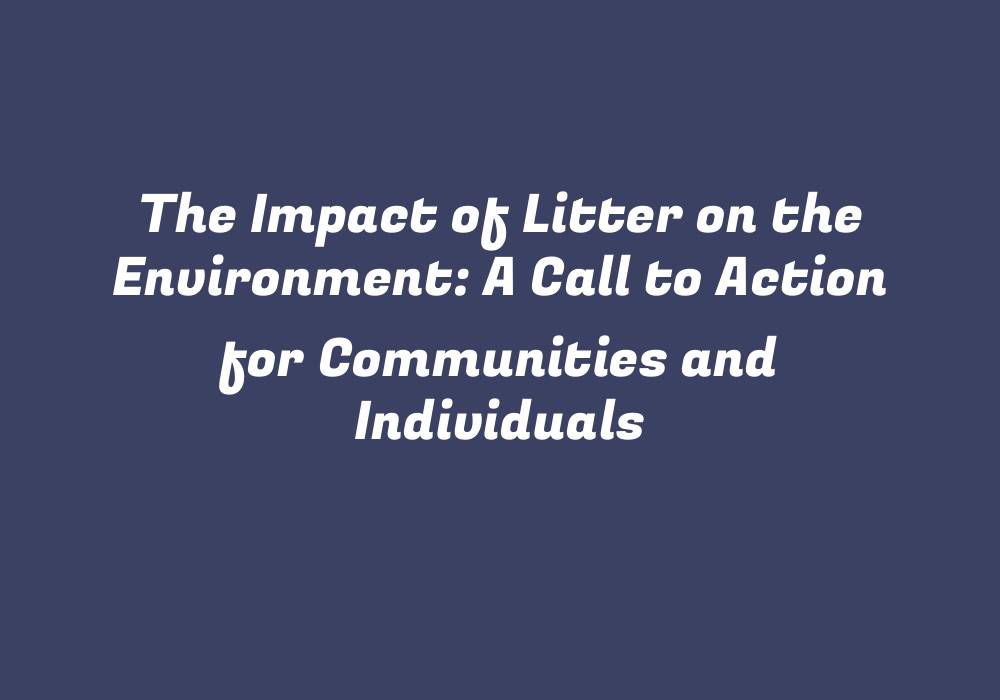Introduction: Litter’s Unseen Consequences
The environmental impact of littering is a serious issue that affects our world in more ways than we can imagine. As communities and individuals, it is crucial for us to understand the magnitude of this problem so that we can take meaningful action to combat its effects. In this article, we’ll explore how litter negatively impacts various aspects of our environment, highlighting the need for a collaborative effort towards preserving our planet’s health.
Air Quality
Litter can be both visible and invisible to the naked eye. The discarded plastic bags, food wrappers, and cigarette butts that we often see on roadsides or in water bodies are just a part of the story. Many littered items eventually degrade into microplastics, which are too small for us to see with our naked eyes. These tiny particles find their way into the air, posing significant threats to air quality and our respiratory systems. Microplastic pollution is increasingly being recognized as a potential cause of health issues like asthma and other respiratory problems.
Ocean Pollution
Litter often ends up in the water system, where it wreaks havoc on our marine ecosystems. Plastic waste is particularly notorious for polluting our oceans and endangering various species of aquatic life. The ingestion of plastics by sea animals like turtles can cause blockages and starvation, while other types of litter like fishing nets can trap marine creatures and even drown them. Furthermore, littered objects can also disrupt the natural habitat and breeding grounds for numerous marine organisms.
Water Contamination
Litter not only threatens our oceans but also has a detrimental impact on freshwater sources like lakes, rivers, and underground aquifers. The chemicals from discarded plastic bags can leach into drinking water supplies, causing potential health risks for humans and wildlife. In addition, litter can create ideal conditions for mosquitoes and other disease-carrying organisms to breed and multiply, leading to outbreaks of diseases such as malaria, dengue fever, and Zika virus.
Impact on Wildlife
Litter poses a grave threat to the survival of many animal species. Entanglement in fishing nets or plastic waste can cause physical injuries, starvation, and drowning among aquatic animals like birds, dolphins, and whales. Similarly, land-dwelling animals often fall victim to littered materials when they mistake them for food or become entangled. Moreover, the harmful chemicals from certain types of litter can accumulate in the fatty tissues of birds and marine creatures, leading to toxicity that impacts their reproductive capabilities and overall health.
Economic Ramifications
Beyond the environmental consequences, the economic costs associated with litter are staggering. Cleaning up after litterers is a significant burden on local government budgets, with resources better spent elsewhere for community development and social services. In addition, litter can negatively affect tourism revenues by deterring visitors who value cleanliness and beauty of their surroundings. Furthermore, the presence of plastic waste in our environment has also resulted in increased healthcare expenses related to respiratory illnesses and other diseases associated with its consumption.
Towards a Litter-Free Future
The fight against litter is a collective responsibility that requires concerted efforts from communities, governments, and individuals. Here are some steps we can take to minimize our impact on the environment:
1. Educate oneself about the various forms of litter and its effects on the environment.
2. Lead by example, starting with small changes such as carrying a reusable water bottle, using cloth bags for shopping, and choosing biodegradable alternatives to single-use plastic items.
3. Encourage others to join you in your efforts by organizing or participating in cleanup initiatives like beach and park cleanups.
4. Lobby for government policies that address waste management and encourage recycling, reuse, and reduction of single-use plastics.
5. Support environmentally conscious companies that prioritize sustainability and reduce their ecological footprint.
In conclusion, the negative impact of litter on our environment is significant and far-reaching, affecting both human health and the wellbeing of numerous species across all ecosystems. To combat this issue, we must come together as communities and individuals in an effort to raise awareness, change habits, and advocate for a more sustainable future for all living things. By taking action now, we can work towards preserving our planet’s beauty and ensuring its long-lasting health for generations to come.
